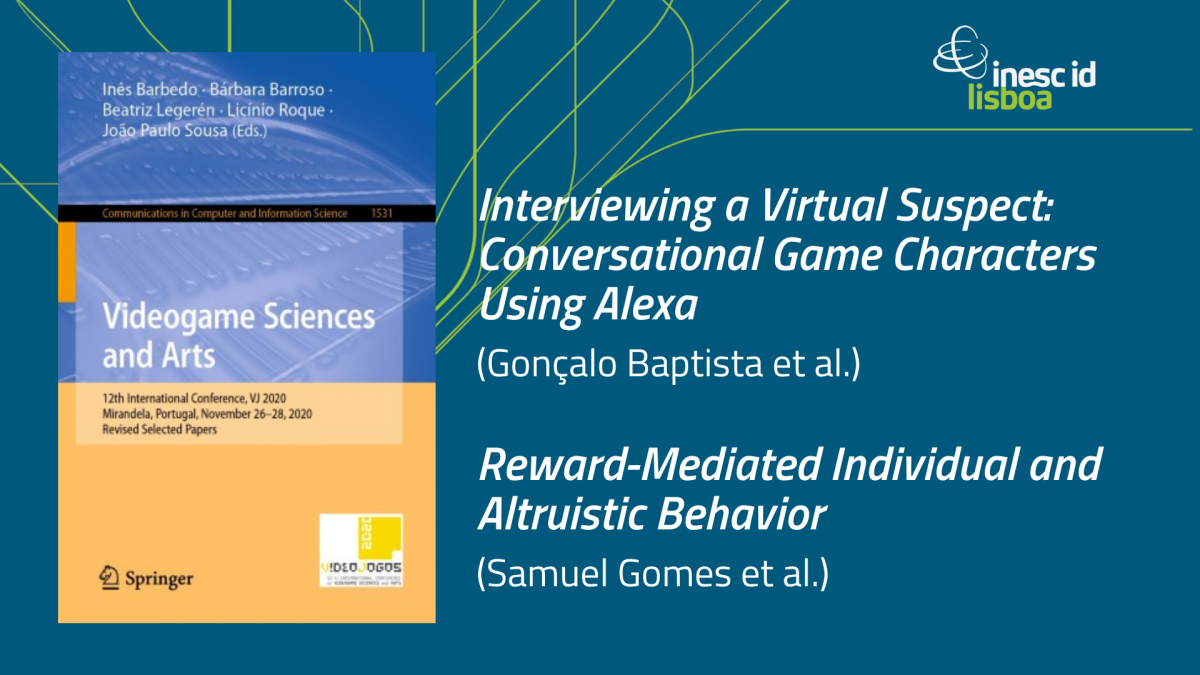
From player’s strategies to natural language interactions: two back-to-back publications in “Videogame Sciences and Arts”
Samuel Gomes and Gonçalo Baptista — two early stage researchers from the Artificial Intelligence for People and Society (AIPS) Research Area at INESC-ID — have recently published back-to-back research papers in Videogame Sciences and Arts, part of the Springer Communications in Computer and Information Science book series. This issue is comprised of selected papers from the 12th International Conference on Videogame Sciences and Arts (VJ 2020; initially to be held in Mirandela, Portugal, but instead hosted online by the Polytechnic Institute of Bragança, EsACT, on 26 to 28 November 2020).
In his paper Reward-Mediated Individual and Altruistic Behavior (with the participation of Tomás Alves, João Dias and Carlos Martinho), Samuel Gomes — a PhD student at AIPS — delved into the long-scrutinized balance between individual and altruistic behaviours, an issue of substantial interest in everyday social dilemmas. By examining the extent to which individual and altruistic score functions led players to vary their strategies and interaction motives within Message Across, an in-loco two-player videogame, Gomes and colleagues were able to demonstrate the value of incentive-based strategies in moderating the emergence of in-game behavior perceivable as either individual or altruistic.
In Interviewing a Virtual Suspect: Conversational Game Characters Using Alexa (a paper authored with Diogo Rato and Rui Prada), Gonçalo Baptista — an alumnus of the AIPS group, where he performed his master’s research — applied a new medium to facilitate the interaction between players and a videogame environment. Using the tools provided by Amazon Alexa, Baptista and his collaborators employed a natural language conversational interaction within the Virtual Suspect game (reported on an earlier publication by Diogo Rato et al.), showing that the use of natural language to support the interaction with game characters has the potential to improve a player’s experience.
On the novelty his paper represents, Samuel Gomes highlighted that “by exclusively using different reward functions in a two-player game, we could implicitly lead people to assume either individual or altruistic task completion strategies, and to self-report their experience as reflecting those styles of interaction,” adding that his paper “sheds light on how to characterize group interaction styles, contributing to the validation of a model of motives behind interaction (between self-oriented and others-oriented),” ultimately resulting in a model that “can be used to characterize people’s interaction preference, and expanded to reflect the interaction styles allowed in other occasions.” Discussing his paper, Gonçalo Baptista pointed out that its major advancement sits with “the exploration of the incorporation of natural language conversational systems to improve user experience when interacting with video game characters,” elaborating that this study “will enable further research into […] improving the user experience, either with a different conversational system or with a revamped agent, as well as the potential integration of this system in a video game.”
These two research papers are an exemplary output from the community of approximately one-hundred-and-fifty early stage researchers currently working at INESC-ID.
Investigating AI systems (agents, robots, etc.) that are social and pro-social — with research work that spans many different topics in affective computing, planning, games & interactive storytelling, robotics, evolutionary game theory and machine learning — AIPS is one of the eleven Research Areas that make up the research tissue of INESC-ID, covering a wide range of topics in computer science and engineering and electrical and computer engineering. You can learn more about the INESC-ID Research Areas here.
